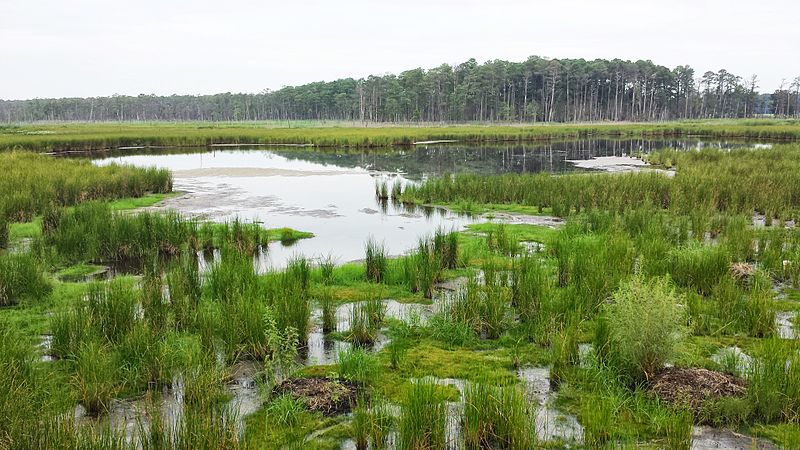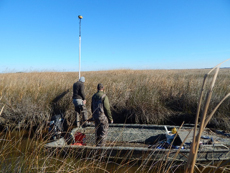Marshes for Tomorrow – Audubon’s Saltmarsh Project Accomplishments in 2015:
In 2015, Audubon continued implementing its program of salt marsh climate adaptation “Marshes for Tomorrow”, with projects in Maryland, North Carolina and South Carolina. This Flyway-wide program was presented at the ACJV Technical Committee meeting at Albany in July.
In Maryland, Audubon and partners at The Conservation Fund, U.S. Fish and Wildlife Service, Sustainable Science LLC and U.S. Geological Survey are implementing two salt marsh resiliency projects funded by National Fish and Wildlife Foundation’s Hurricane Sandy Coastal Resilience Grant Program. At Blackwater National Wildlife Refuge, we completed project design and permit applications for sediment enhancement of 35 acres of subsiding tidal marsh. The goal is to raise the marsh surface in order to extend the longevity of the marsh and convert fragmenting threesquare-smooth cordgrass habitat to high marsh dominated by meadow cordgrass, preferred by Saltmarsh Sparrow.
At Farm Creek Marsh, owned by the Chesapeake Audubon chapter, we are undertaking a hydrological study of 100 acres of tidal marsh threatened with erosion by waterlogging. The study will determine the causes of the waterlogging and produce an engineering solution to alleviate it. In 2015, Audubon collected baseline data on birds and vegetation, and treated 20 acres with glyphosate (sprayed by helicopter) to control invasive Phragmites. Pickering Creek Audubon Center in Easton, Maryland, is engaging local communities by recruiting volunteers from business, faith and higher education groups to restore eroded marsh with plantings of marsh grasses.
The Donal C. O’Brien Audubon Sanctuary & Center in Corolla, North Carolina, is working to protect and restore wetlands throughout the Currituck Sound. In 2015, the Alliance to Restore Currituck Sound was formed, with plans for their first marsh restoration projects next year.
Audubon South Carolina worked with USFWS, ACJV and others to identify strategies to protect salt marsh migration corridors and manage coastal impoundments for migrating shorebirds and wintering marshbirds in the Broad River and ACE Basins.


